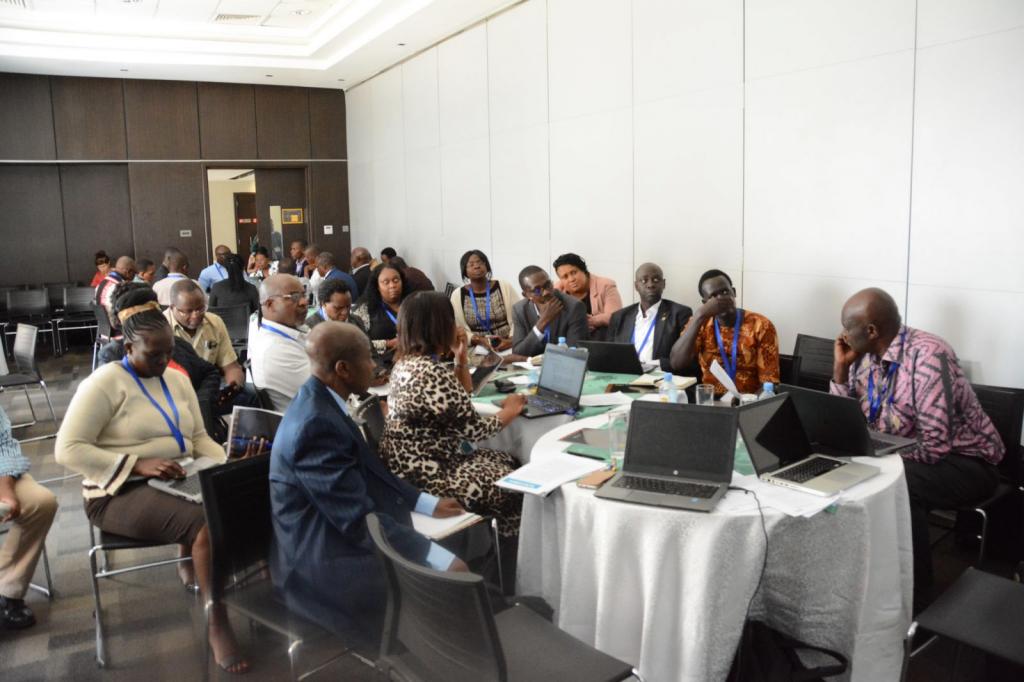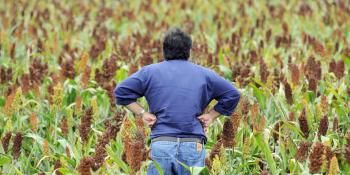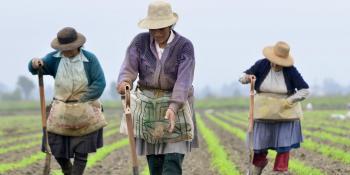African negotiators talk adaptation tracking, soil fertility and gender

Country negotiators, agriculture and gender experts from across Africa met in Nairobi to develop a joint continental position for this year's climate negotiations.
Prior to each meeting of the United Nations Framework Convention on Climate Change (UNFCCC)’s Subsidiary Bodies on Scientific and Technological Advice (SBTSA) and Implementation (SBI), countries and observer bodies are invited to make submissions on pre-determined topics. This month, the Subsidiary Bodies will meet in Bonn, Germany, to discuss topics within the Koronivia Joint Work on Agriculture (KJWA) roadmap.
In May 2019, during the latest capacity building and strategy meeting of the African Group of Negotiators Expert Support (AGNES)* team, over 45 agriculture negotiators, including 23 gender negotiators and experts and key stakeholders with representation from 20 countries came together in Nairobi, Kenya. Over the course of two days, these negotiators debated key issues, learned negotiation skills, and crafted a joint submission that will represent the continental position on the following topics:
- Methods and approaches for assessing adaptation, adaptation co-benefits and resilience (2b);
- Improved soil carbon, soil health and soil fertility under grassland and cropland as well as integrated systems, including water management (2c).

Agriculture and gender experts develop Africa's submission regarding adaptation, soil and gender action to the UNFCCC. Photo: A. Virero (CCAFS)
Assessing adaptation, adaptation co-benefits and resilience
Discussion amongst the meeting participants highlighted the current lack of existing methods to track and assess adaptation, adaptation co-benefits and resilience. Most existing frameworks are created at the project level and are not easily applied at the international or even national scale. Stocktaking of the gaps among existing methods and approaches was recommended to address this issue.
The draft submission also recommended developing an appropriate framework for tracking adaptation, adaptation co-benefits and resilience in the agriculture sector across scales for effective implementation of Nationally Determined Contributions (NDCs). The final recommendation was to facilitate international cooperation and support with regards to financial resources and capacity building to implement the framework.
Now the real work begins...crafting the language for the AGN submission to #SB50. A masterclass in negotiation and wordsmithing. @CGIARclimate @AfDB_Group @NEPAD_Agency @cgiarclimate_EA pic.twitter.com/8OvDl7XybB
— Laura Cramer (@MamaNjihia) May 15, 2019
Improved soil carbon, soil health and fertility
The discussion on this topic centered on the importance of soil mapping at appropriate resolutions for informing interventions at various scales. The group recommended that SBSTA and SBI be requested to develop guidelines for long-term assessment of soil carbon, soil fertility and soil health trends in different agricultural systems. In addition, the participants recommended the facilitation and mobilization of support for developing countries to access financial resources and capacity building. These will help facilitate the framework and the large-scale deployment of integrated soil, nutrient and water management technologies.
Review of the Gender Action Plan (GAP)
There is need to build the capacity of women negotiators to participate effectively in the UNFCCC
GAP, adopted at the 23rd session of the Conference of the Parties (COP23), aims to enhance the mainstreaming of gender across all UNFCCC negotiations streams and encourages countries to take deliberate steps in ensuring that gender considerations are mainstreamed into national climate policy processes. The African Working Group on Gender and Climate Change (AWGGCC)—the gender segment of the AGNES—played a crucial role in the negotiations that led to the adoption of the GAP.
There is need to build the capacity of women negotiators to participate effectively in the UNFCCC, including enhancing the capacity of negotiators to articulate gender issues across climate discussions.
Next steps for AGNES
In addition to the draft submissions that were prepared, the attendees also discussed other next steps. AGNES will initiate a leadership program on climate science, diplomacy and negotiations in collaboration with selected universities across the sub-regions of Africa and other international universities. Plans are underway to formalize the agreements with hosting institutions.
There will also be efforts to strengthen the capacity of the Francophone countries to participate in UNFCCC negotiations through generating scientific evidence to support policy processes, and participation of negotiators in UNFCCC processes. A working group of African scientists focused on adaptation tracking is also being formed to contribute to these dialogues at the international level.
The meeting incorporated an overview by Dr. Marlies Craig, Science Officer for the Intergovernmental Panel on Climate Change (IPCC), on how to get involved as a reviewer in the next IPCC Assessment Report (AR6). This presentation came about due to concerns over a general lack of African perspectives in the IPCC reports and the need to have more African-led science included in the assessment reports.
Read more:
- Blog: Gender Action Plan aims to integrate gender into climate change policies and strategies
- News update: Moving to implementation: Africa's approach to the Koronivia Joint Work on Agriculture roadmap
- Resolution: Gender Action Plan
- Submission: Submission from the CGIAR System Organization, International Center for Tropical Agriculture and the World Bank, in response to Decision 4/CP.23.
- Submission: Submission to SBSTA/SBI by Kenya on the Koronivia Joint Work on Agriculture (KJWA) topics 2b and 2c
*AGNES was created in 2015 to provide scientific expertise and evidence-based information to African climate negotiators. AGNES seeks to facilitate the exchange of ideas between experts and negotiators in an international setting. In this environment, scientific evidence is a major tool that AGNES uses to inform the unified common African position on matters related to climate change. Since its formation, AGNES has assisted the African Group of Negotiators (AGN) to develop and defend their position using science-based evidence on agricultural and gender issues.
The two-day meeting was supported by the CGIAR Research Program on Climate Change, Agriculture and Food Security (CCAFS), African Group of Negotiators Expert Support (AGNES), the Food and Agriculture Organization of the United Nations (FAO), the International Development Research Centre (IDRC), the New Partnership for Africa's Development (NEPAD), the International Center for Tropical Agriculture (CIAT), Comprehensive Africa Agriculture Development Programme (CAADP-GIZ) Support Program, the World Bank, the World Agroforestry Centre (ICRAF) and the African Centre for Technology Studies (ACTS).
Catherine Mungai is the Partnerships and Policy Specialist for CCAFS East Africa. Laura Cramer is the Science Officer for the CCAFS Flagship on Priorities and Policies for CSA. Maren Radeny is the Science Officer for CCAFS East Africa.



